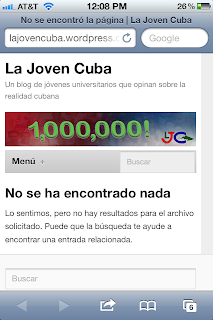First an apology.
I last posted here on May 20, exactly one month ago.
A thousand blog ideas have filled my head in that too long a time between posts but, being so busy, I always told myself that I would wait to post when I had more time to "develop" the idea more fully. Then when I would sit down to write, either the original idea was gone or its time and relevance had passed.
I should just accept that a blog is more of a "perpetual beta" and not a forum for polished, perfect essays.
Then there is the impact of my constant Tweeting on the frequency of my blog posting. I don't know how Yoani does it but her obsessive and always entertaining and informative Tweets do not seem to subtract from her eloquent and constant blog posts... Too bad I can't say the same for myself.
But since I have a day job that pays my rent and puts food on the table, I tend to use my Tweets as a shortcut to get the hot stuff into cyberspace and then never get around to blogging...
So, readers beware and be ready: I resolve to post more, but more briefly in the coming months.
***
As a first foray into brevity (yeah, right!), I'll give my quick take on LASA 2012, San Francisco here.
LASA is always a marathon and when the city it's in is seductive as is the case with San Fran, I have been known to abscond on most of the panels to see the sights. This time around, however, my fiancé joined me at the end of the conference and we stayed in the city for a few extra days to walk up and down some of those hills!
This gave me the excuse to be quite disciplined for a change and spend 3+ days filled with panels, receptions, workshops, debates, a brief Q&A with Mariela Castro, and even a public exchange with none other than author and head of the Cuban Writers and Artists Union (UNEAC), Miguel Barnet.
I got to Mariela Castro's talk early and sat in the front row directly facing the podium. While I was disappointed by the great silence in her talk about issues of tolerance and inclusion beyond those affecting the LGBT community, I must admit that I was impressed with her intelligence, radicalism (that's meant to be a compliment), and professional, focused scope and tone.
I recorded her presentation and will embed it here when I figure out how to put audio on my blog. (I can do video with a YouTube embed but can anyone help me with an audio file?)
I asked her the first question, focusing on her recent Tweet from March where she indicated that the
Cuban blogosphere was much better than the Cuba press at reflecting the complexities and many colors of Cuba's diverse reality. I simply asked, given her comment and her highlighting a number of LGBT themed blogs in her presentation, which blogs she reads regularly and would recommend. Unfortunately, she really didn't answer the question other than to say that she's no expert on Cuban blogs but that she was impressed with the young bloggers she had met the previous month in Matanzas at the "Blogazo por Cuba" event there.
Later I kicked myself for wasting my opportunity with such a softball question. I should have asked this:
"Obama just 'came out' publicly in support of gay marriage. Do you know if the President of Cuba is also in favor of legalizing same sex marriage in his country?"
To that I could have added this follow up:
"Most gains in the US for LGBT rights have come from independent groups agitating the powers that be for respect and recognition. In Cuba, you lead this fight from within a government institution. What freedoms to organize are there and what movements exist in Cuba that advocate for LGBT rights outside of state institutions and even outside of socialism or the revolution."
Alas, I chickened out on this one. (But not the next one as you will see...).
Later that same evening, the LASA Cuba section held its meeting, which as a member in good standing, I attended.
The meeting began with a petition being passed around about the Cuban 5.
Then, the BIG issue that consumed the better part of an hour or more was addressed. While Mariela had been granted a visa (provoking howls of protest from hard right Cuban-American politicos), another 10 Cuban participants (out of a huge Cuban delegation 75-strong) had been inexplicably denied theirs. This seemed particularly arbitrary and the result of a cynical and cowardly political calculation since the majority of those denied this time around regularly travel to the US for academic purposes (such as Carlos Alzugaray, Rafael Hernandez, and Esteban Morales). I even had Carlos give a very rich and contentious guest lecture in my Cuba class at Baruch in the fall semester, 2011.
There were 10 empty chairs lined up in the front of the auditorium with the name of one of "the 10" on each of them.
The Cuba section had previously circulated a petition via e-mail denouncing the denials of these visas, which I had signed with conviction - but also with a bit of hesitation since it failed to mention the fact that the Cuban government also, and more systematically, controls and frequently denies Cubans the right to travel abroad.
As the petition made the rounds, a long line of speakers, almost all of them other "Yumas" like myself (well not exactly like me as it turned out) took the mic and proceeded to heap righteous scorn on the US State Department.
While I had signed onto the petition, I grew increasingly uncomfortable with the almost gratuitous blindness and hypocrisy with which these speakers invoked the violation of our "
right to hear the voices of the Cuban people" and the "
denial of our rights to work with our Cuban colleagues."
When I could no longer bear this willful partiality and almost comical parody of a meeting of the Communist Party, I took my turn at the mic, knowing I would be "
hablando de la soga en la casa del ahorcado" (bringing up the rope in the house of the condemned), as the phrase goes.
I began by agreeing with the basic principle that the previous speakers had defended, indicating that my own students had greatly benefitted from hearing and rigorously debating with Carlos Alzugaray when he visited our class the previous semester. I also reminded my colleagues that the full name of the Cuba Section of LASA is the "
Scholarly Relations with Cuba" Section, something we should promote and defend on principle and impartially.
However, I parted company with the previous speakers when I pointed out that if we were going to defend the principle of academic exchange and criticize the unjustifiable political manipulation of that exchange then we must do so consistently when either (or any) government, including the Cuban government, violates it.
Then I dropped the proverbial bomb.
Since I was acutely aware of two specific cases where Cubans I have worked with in an academic, professional capacity had been denied exit permits, I mentioned this fact loudly and clearly. The Cuban economist
Oscar Espinosa Chepe and blogger
Yoani Sanchez had both been invited to participate in previous LASA conferences, but both were denied permission to leave the island by the Cuban government.
To wit, I pointed out that it is one thing for a foreign government to deny you permission to
enter their country, but quite another for your own government to prevent you from
exiting!
I could feel the oxygen rush out of the room as everyone did a collective inhale in response to my impertinence.
Almost immediately, even before I could get back to my seat,
Miguel Barnet, who had been seated next to Mariela Castro (translating my remarks to her as I spoke), jumped to his feet, took the mic, and declared in no uncertain terms that:
"It is unacceptable that we grant the same rights deserved by academics to such mercenaries!"
It went downhill from there, with a parade of "Yumas" (but not like me!) agreeing with Barnet that, in essence, not all Cubans are created equal and deserving of the same rights.
Oy vey!
***
For other versions of and reactions to these events, you can go first and foremost to
CafeFuerte, to which I gave an interview following the event. The usually sharp and balanced
Cuba Central Blog also gave a summary of the event, but managed to completely skip over my "unfortunate" if brave remarks.
Yoani Sanchez discussed the issue in a powerful blog post, "
The Cuban Intelligentcia: Hide or Debate?"
Haroldo Dilla also wrote eloquently about it at Havana Times, as did both Chepe - who asked Barnet with moxie:
Who is the Mercenary? - and his wife
Miriam Leiva.



































